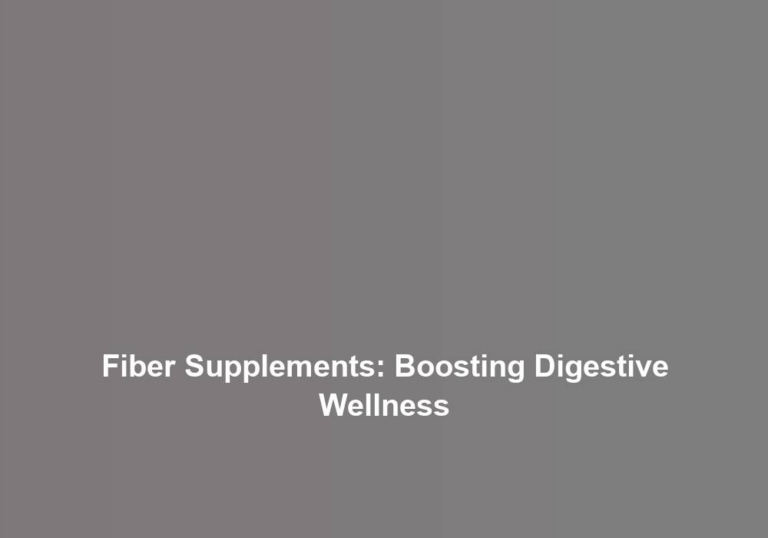Fiber Supplements: Enhancing Digestive Health
Are you looking for a simple yet effective way to improve your digestive health? Perhaps youG??ve heard about the benefits of fiber supplements but arenG??t quite sure where to start. With so many options on the market, it can be overwhelming to figure out which one is right for you. But fear not, because understanding the role of fiber in your digestive system and how supplements can enhance it is the first step toward making informed choices for your health.
The Importance of Fiber in Digestive Health
Incorporating an adequate amount of fiber into your diet is essential for maintaining optimal digestive health. The benefits of fiber go beyond just keeping you regular; it plays a crucial role in preventing digestive disorders and promoting overall well-being. Fiber acts as natureG??s broom, aiding in the smooth movement of food through your digestive system, preventing constipation, and reducing the risk of developing hemorrhoids. Additionally, fiber supports the growth of healthy gut bacteria, which is essential for a strong immune system and efficient digestion.
When it comes to sources of fiber, look no further than fruits, vegetables, whole grains, and legumes. These wholesome foods are not only rich in fiber but also contain a myriad of essential vitamins and minerals that contribute to your overall health. By incorporating a variety of these foods into your diet, you can ensure that you are reaping the digestive health benefits of fiber.
Furthermore, a fiber-rich diet can help in weight management by promoting a feeling of fullness, reducing the likelihood of overeating. This is particularly important for those looking to maintain a healthy weight, as being overweight can increase the risk of digestive issues such as heartburn, reflux, and gallbladder problems. By embracing the benefits of fiber, you are not only supporting your digestive health but also taking a proactive step towards your overall well-being.
Understanding Different Types of Fiber Supplements
If you want to explore the benefits of fiber supplements in enhancing your digestive health, understanding the different types available is essential. Fiber supplements come in two main types: soluble and insoluble. Soluble fiber dissolves in water and forms a gel-like substance in the digestive tract. It can help lower cholesterol and regulate blood sugar levels. Insoluble fiber, on the other hand, does not dissolve in water and adds bulk to the stool, aiding in regular bowel movements and preventing constipation.
When it comes to natural sources of fiber, there are plenty of options to choose from. Fruits such as apples, berries, and oranges are excellent sources of soluble fiber. Meanwhile, whole grains, nuts, and vegetables like broccoli and carrots are rich in insoluble fiber. However, if you struggle to consume adequate amounts of fiber through your diet alone, fiber supplements can be a convenient way to bridge the gap.
ItG??s important to note that some fiber supplements contain a combination of soluble and insoluble fiber to provide comprehensive digestive support. Before choosing a fiber supplement, consider your specific needs and dietary habits. Consulting with a healthcare professional can also help you determine the most suitable option for your digestive health. Remember, while fiber supplements can be beneficial, they should complement a balanced diet and healthy lifestyle rather than replace natural sources of fiber.
How Fiber Supplements Support Gut Health
To support gut health, fiber supplements can aid in maintaining regular bowel movements and a healthy digestive system. Fiber supplements play a crucial role in supporting the balance of gut microbiota, which are the beneficial bacteria living in your digestive tract. These supplements provide the necessary nourishment for the good bacteria in your gut, promoting a healthy and diverse microbiome. By doing so, fiber supplements help in keeping your digestive system in optimal condition, contributing to your overall well-being.
Furthermore, fiber supplements support gut health by assisting in the production of digestive enzymes. These enzymes are essential for breaking down food and absorbing nutrients, and fiber helps in their proper function. Adequate fiber intake can enhance the activity of digestive enzymes, ensuring that the food you consume is effectively digested and the nutrients are readily absorbed. This, in turn, reduces the strain on your digestive system and supports its overall health.
Tips for Choosing the Right Fiber Supplement
When selecting a fiber supplement, consider your dietary needs and any digestive sensitivities you may have. Start by evaluating the type of fiber that would best suit your needs. Soluble fiber supplements, such as psyllium husk, can help with issues like constipation, while insoluble fiber, like wheat bran, can aid in promoting regularity. ItG??s important to choose a supplement that aligns with your specific digestive concerns.
Another crucial aspect to consider is the effective dosage. Begin with a lower dose and gradually increase it while monitoring its effects on your digestion. This approach can help prevent potential side effects like bloating, gas, or stomach cramps that may occur when significantly increasing your fiber intake too quickly. Additionally, ensure to drink plenty of water when taking fiber supplements to help them work effectively in your digestive system.
When seeking the right fiber supplement, itG??s essential to prioritize products that are made from natural sources and are free from added sugars or artificial ingredients. Reading product labels and researching reputable brands can aid in making an informed decision. Furthermore, consider consulting a healthcare professional or a registered dietitian to receive personalized recommendations tailored to your specific dietary and digestive needs.
Incorporating Fiber Supplements Into Your Daily Routine
Consider incorporating fiber supplements into your daily routine to support your digestive health and overall well-being. Incorporating fiber supplements can provide various dietary benefits, especially if you struggle to meet your daily intake of fiber through your regular diet. By adding fiber supplements to your daily routine, you can ensure that you are getting an adequate amount of fiber, which is essential for proper digestion and overall health.
To seamlessly incorporate fiber supplements into your daily routine, you can start by choosing a specific time each day to take your supplement. Whether itG??s with breakfast, lunch, or dinner, establishing a consistent routine will help you remember to take your supplement regularly. This simple habit can make a significant difference in your daily fiber intake and overall digestive well-being.
Another way to incorporate fiber supplements into your routine is by mixing them with your favorite foods or beverages. Many fiber supplements come in powder form and can easily be added to smoothies, yogurt, or even water. This makes it convenient to consume your supplement without feeling like itG??s an additional task.
Remember to stay hydrated when taking fiber supplements, as they work best when consumed with an adequate amount of water. Additionally, gradually increasing your fiber intake through supplements can help your body adjust more comfortably.
Incorporating fiber supplements into your daily routine can be a simple and effective way to support your digestive health and overall well-being.
Conclusion
So, next time youG??re feeling bloated and uncomfortable, just remember that fiber supplements are there to save the day. ItG??s ironic how something so small can make such a big impact on your digestive health. Who would have thought that a little extra fiber could be the key to feeling lighter and more energized? ItG??s a funny world we live in, but hey, at least your gut will thank you for it!







